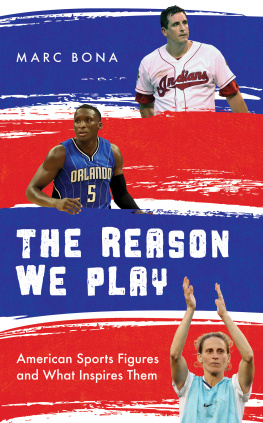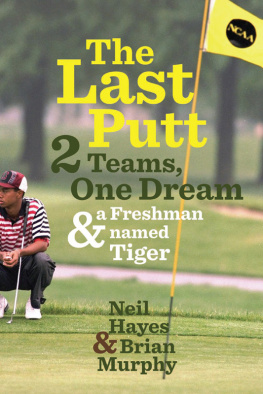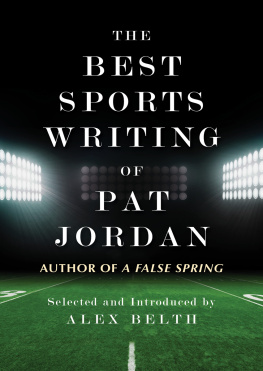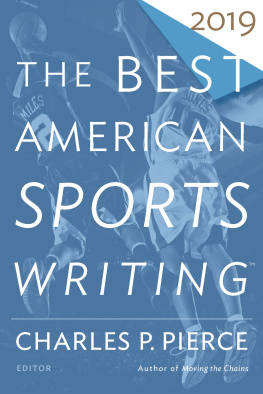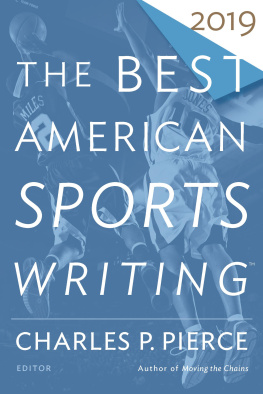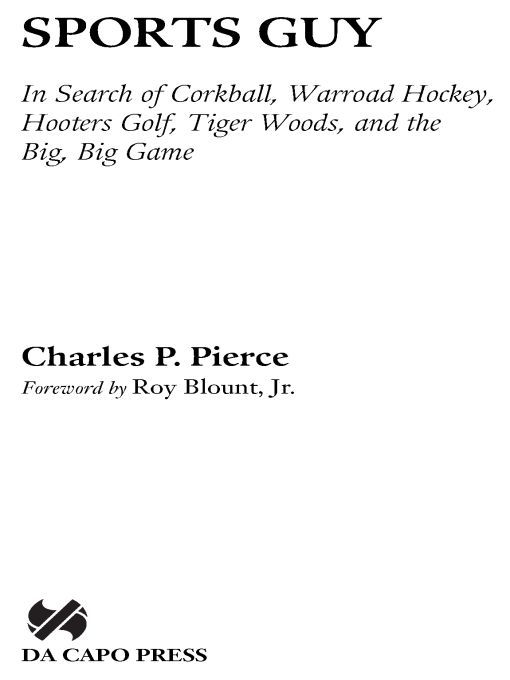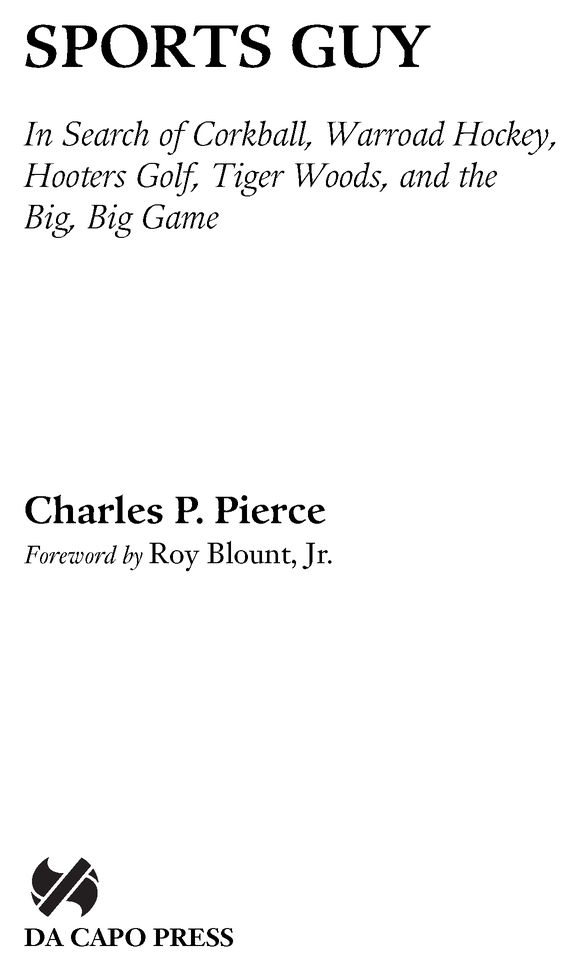Table of Contents
Also by Charles P. Pierce
Hard to Forget: An Alzheimers Story
To Abraham, Brendan, and Molly,
something thats not from the airport gift shop.
And in memory of Shelby Strother.
Truth is an odd number.
Flann OBrien At Swim-Two-Birds
FOREWORD
Roy Blount, Jr.
My own personal America, writes Charlie Pierce, comes with six seconds left and the home teamanybodys home teamwith the ball and trailing by a point or a goal. There is barbecue at the concession stand, and there is beer in a paper cup, and a band is playing across the way. I can be happy there. From that perspective, he can look at contemporary stockcar racing, for example, and put his finger on what is wrong not just with big-time sports today, but with American culture-slash-enterprise in general. Corporate connivance dressed up as populist celebration... as raucous authenticity, is leaching the humor out of everything, even Spam. But Pierce still has a fine palate for the salt of the earth. Sportswriting will not lack savor, or humor, as long as Charlie is handsomely sustaining a certain tradition.
A quarter-century or so ago, I was talking to a feature writer who had been assigned by a general magazine to work up yet another story about the dubious hoopla surrounding the Super Bowl. Though her publication was weekly, she struck me as an everyday enough person, not too fastidious or she wouldnt have been talking to me. But at one point she looked around the press room and exclaimed, Sportswriters! In a tone of disdain!
I was startled. I like sportswriters, I said.
She looked startled. Theyre such scruffy guys, she said.
I like scruffy guys, I said. That is not how I should have put it. I should have said, You cant generalize from their haircuts, or You must mean raffish guys or hungover guys. But her remark had thrown me off balance. To me it seemed clear that the least cheesy aspect of the proceedings, aside from the actual blocking and tackling and pass-catching to come, was these guys persistence in pounding out copy, exchanging pungent anecdotes, and griping about the promotional packaging that was overshadowing the game.
This was back before commercial television had quite permeated the sports atmosphere as it has today, to the point that no sports hero with any sense of how his bread is buttered can be expected to see any value in speaking with the media other than on camera, emptily, to the full satisfaction of Nike, Taco Bell, and the heros various moneyhandlers. Back then, cities had not yet begun to name their bowls and stadia for amorphous conglomerates instead of agricultural products and mean old sonsofbitches. Back then, a sportswriter still might chew a domestic cigar and sip a medicinal beer while he worked. It was not as though these guys were unacquainted with high style, for they had seen Native Dancer in the paddock in his prime, and he them there in theirs. But they would have snorted at any ascription of positive value to the wearing of Armani. Their sense of couture was best represented by the scribe who wore his new blazer proudly until (and, if the truth be known, even after) an usher came up to him and said, Hey, buddy, where do we turn these in after the game?
Today you could call guys like that countercultural. And some of the younger ones could call themselves that back then. They shared the older writers admiration for tough, salty, rise-to-the-occasion performers whose calluses and glints were in all the right places (Arnold Palmer, Al McGuire, Bill Russell, Darrell Royal, Frank Robinson, Billie Jean King); but their tastes and their politics had been colored by the sixties and Muhammad Ali. They could hang with the crusty old guys and also with long-haired and perhaps herbally stimulated young athletes. They were to sportswriting as Willie Nelson to country music: traditionalist but loose.
I recollect Charlie Pierce as one of those young guys then, and he manages somehow, mutatis mutandis (I gather that no employable journalist of any age can stay out as late as we did regularly, lightsomely, back then), to be one of them still. Cognizant of both baseball and rock and roll, he is witness not only to the first lifetime home run of an obscure Tiger named Jim Walewander, but also to the fact that the fans cheering Walewander include Dean Clean, Joe Jack Talcum, Dave Blood, and Rodney Anonymous: The Dead Milkmen.
At this point I would like to quote some of Pierces best lines, but I would just be stealing them, and you will enjoy them more in context. He has a flair for spontaneous fooleryas you will have learned if you have heard him on Wait, Wait, Dont Tell Me, a National Public Radio show on which he and I often fool around togetherbut he is no snide wisecracker, not one of these snarky junk-ironists who will fill an entire column with obscurely knowing one-liners. Charlie the tough-love romantic can get up for a game, at the high-school or the Olympic level. I dont understand these sportswriters who dont like sports, he remarked recently. He has the observational chops to examine an icon like Tiger Woods or Magic Johnson both critically and sympathetically, close-up yet with detachment. He has the wit to view with bemused relish the proliferation of superjewelry on todays lavishly compensated players, and also to elicit from one of them the following explanation of why he is not wearing his usual mega-necklace: Its in the shop.
It is not because he is caught up in nostalgia that Pierce evinces such a keen sense of what tends to be missing in sports and other aspects of culture today. It is because he is still resourceful and hearty enough to dig up and appreciate the good stuff. He has been around long enough, and still gets around widely enough, that when he says something is the damnedest thing he has ever seen, he is saying something.
PREFACE
Im a rummager and a scuffler in my business. Always have been. I love odd bits of business, the strings, old shoe buttons, and battered tin cornets of history. I dont know where it comes from, although my grandmother was an old Irish farm girl who used to tell me the stories that shed heard from the shanachie, the itinerant storytellers who functioned both as entertainment and as a collective memory in the old Ireland. The shanachie told stories for food and drink. If the story was drab, or if it ran too short, out he went hungry onto the Tralee Road in the rain.
That may be where it comes frommy love for small town libraries, and for tiny museums, where the helpful elderly volunteers always have the skinny on the point guards grandfather, or memories about the great flood that changed the towns history, and how the celebrity outfielders neighborhood came to be built on what used to be the town cemetery. The drifting dead, then, become as much a part of the outfielders story as his glove, or his bat, or his minor-league manager, who (maybe) once was a preacher. And thats the way my stories grow. The best ones, anyway.
There are a number of stories in this collection that can loosely be called celebrity profiles. This is not an unfamiliar genre; a friend of mine calls them arugula stories, as in: (Fill In Your Favorite Greasy-Haired Dyspeptic Young Movie Star Here) looked out over his arugula salad at the trendy Beverly Hills bistro and sighed. We have them in sportswriting, too. In fact, we have more and more of them, as athletes increasingly have more and more in common with other celebrity entertainers. Frankly, they are my least favorite pieces herein collected.


